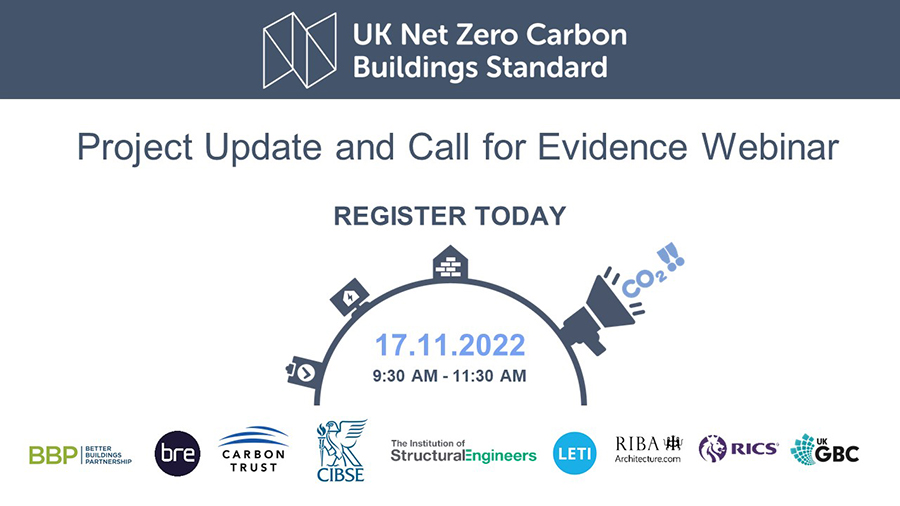UK Net Zero Carbon Buildings Standard coalition call for evidence
Contents |
[edit] NZCBS call for evidence
The team developing the UK’s Net Zero Carbon Buildings Standard (the NZCBS) has launched a call for evidence, to help inform and guide the development of the Standard.
Once developed, the UK Net Zero Carbon Buildings Standard will provide a single agreed definition and methodology for the industry to determine what constitutes a net zero carbon building. The cross-industry group developing the Standard and championing this initiative includes representatives from the following organisations: Better Buildings Partnership (BBP), Building Research Establishment (BRE), the Carbon Trust, Chartered Institution of Building Services Engineers (CIBSE), Institution of Structural Engineers (IStructE), Low Energy Transformation Initiative (LETI), Royal Institute of British Architects (RIBA), Royal Institute of Chartered Surveyors (RICS), and UK Green Building Council (UKGBC).
Having established governance and delivery teams, the NZCBS coalition is now calling on UK built environment industry practitioners to supply operational energy and embodied carbon performance data for their buildings. This will support the development of their evidence base over the coming months.
[edit] Operatonal energy data
Firstly, the NZCBS coalition is seeking operational energy data for buildings - specifically in-use consumption data from the best performing existing buildings, and modelled performance data for buildings in design or construction. This data will enable the NZCBS development team to understand what today’s benchmark for energy performance is, and what current and future best practice might look like. As part of this, the NZCBS is also calling for experts to assist with energy modeling - more information on this can be found in the call for evidence guide.
[edit] Embodied carbon data
Secondly the NZCBS team is seeking embodied carbon data from both new construction and retrofit projects. This will enable the NZCBS development team to set out benchmarks for embodied carbon emitted in the construction process of different building types across the UK.
[edit] Webinar and guidance
Participants are invited to submit data via the Built Environment Carbon Database.The deadline for submitting data is 16th December 2022. The NZCBS Call for Evidence coincides with the launch of the beta version of the BECD this week.
Those with operational energy and embodied carbon performance data to share are encouraged to review the call for evidence guide, available on the project website with more detail on the process for supplying data.
For additional guidance on relevance and suitability of data required, the team can be contacted on: [email protected] or [email protected], depending on the type of data in question.
The NZCBS Technical Steering Group will be hosting a webinar on Thursday 17th November at 9.30am. They’ll be providing a general update on progress on the development of the Standard as well as taking part in an audience Q&A session. Find out more and register to attend.
[edit] Comment
David Partridge, Chairman, Related Argent and Chair of the UK Net Zero Carbon Buildings Standard Governance Board, said:
“If the real estate industry and built environment is to seriously address its impact on climate change, a universally adopted Net Zero Carbon Buildings Standard is absolutely essential. We are looking for built environment professionals to contribute data from a number of different asset types to develop a single, agreed methodology and for all stakeholders in the real estate industry who will be using the Standard to get involved in order to formulate it appropriately. Please contribute to our call for evidence and join us in our update event to learn more about our plans and programme for developing and testing the Standard.”
Clara Bagenal George, LETI and Chair of the UK Net Zero Carbon Buildings Standard Technical Steering Group said:
Not only will this project deliver much needed clarity on how to verify net zero carbon buildings in the UK. But it also brings together key organisations that have been working in this space, to create a robust, industry led Net Zero Carbon Buildings Standard, created through consensus and collaboration based on science.
This article was issued as a Press Release dated Thursday 3 November 2022 entitled 'UK Net Zero Carbon Buildings Standard coalition launches call for evidence' issued by [email protected].
[edit] Related articles on Designing Buildings
Featured articles and news
Grenfell Tower Principal Contractor Award notice
Tower repair and maintenance contractor announced as demolition contractor.
Passivhaus social homes benefit from heat pump service
Sixteen new homes designed and built to achieve Passivhaus constructed in Dumfries & Galloway.
CABE Publishes Results of 2025 Building Control Survey
Concern over lack of understanding of how roles have changed since the introduction of the BSA 2022.
British Architectural Sculpture 1851-1951
A rich heritage of decorative and figurative sculpture. Book review.
A programme to tackle the lack of diversity.
Independent Building Control review panel
Five members of the newly established, Grenfell Tower Inquiry recommended, panel appointed.
Welsh Recharging Electrical Skills Charter progresses
ECA progressing on the ‘asks’ of the Recharging Electrical Skills Charter at the Senedd in Wales.
A brief history from 1890s to 2020s.
CIOB and CORBON combine forces
To elevate professional standards in Nigeria’s construction industry.
Amendment to the GB Energy Bill welcomed by ECA
Move prevents nationally-owned energy company from investing in solar panels produced by modern slavery.
Gregor Harvie argues that AI is state-sanctioned theft of IP.
Heat pumps, vehicle chargers and heating appliances must be sold with smart functionality.
Experimental AI housing target help for councils
Experimental AI could help councils meet housing targets by digitising records.
New-style degrees set for reformed ARB accreditation
Following the ARB Tomorrow's Architects competency outcomes for Architects.
BSRIA Occupant Wellbeing survey BOW
Occupant satisfaction and wellbeing tool inc. physical environment, indoor facilities, functionality and accessibility.
Preserving, waterproofing and decorating buildings.

























